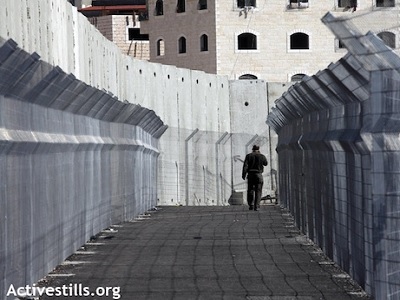
By Palestine Chronicle Staff
The Palestinian Center for Human Rights published a report on April 13, detaining the life of a Palestinian family who lives in isolation behind Israel’s separation wall in the West Bank.
PCHR’s report details the story of Hani Amer, a 59-year old father of four sons and two daughters, whose family “is deeply rooted in Kafr Qasim, which is located on the western side of the annexation wall that is separating Palestine from Israel.”
When the state of Israel was declared in 1948, his family was expelled, lost their land and moved to Salfit governorate, located on the eastern side of the wall.
Separation Anxiety Wall in West Bank, Ramallah, State Of Palestine. pic.twitter.com/XEAmHWiYuh
— آصف رئیس (@AasifAlrayys) March 24, 2017
“The catastrophe of my family started already in 1948 and not only with the construction of the wall in 2003. The wall is the last and not the first problem”, Hani Amer noted.
Hani’s house was build in the 1970s, but three years following the family’s move to the new house, Israel claimed the lands around the house and started building a settlement for Jews only, which is illegal under international law.
“The Israelis told me that I have a choice to make: Either, the wall will be built exactly in the place of my house and I will have to move to the other side of the wall, or they will make our life miserable and we will have to suffer”, Hani said.
Not willing to give up their home, the Amer family decided to stay and has been paying a high price for their decision since then.
This canvas is 8m high and 700km long the Separation Wall,West Bank @thereaIbanksy pic.twitter.com/atbLJ6DQo4
— Philip Jennings (@PJenningsUNI) March 12, 2017
“Between 2003 and 2010, I barely slept and stayed awake during most nights to be prepared when settlers would attack us. They attacked our house and my family, they showed up in my garden and threw stones, screamed at us and harassed us frequently”, Hani explained.
Moreover, the settlement and annexation wall had severe economic and social consequences for the Amer family, as both facts on the ground not only separated them from the town of Mas’ha, but also expelled Palestinian businesses that were located on the main road between Kafr Qasim, Mas’ha and Qalqilya.
“Before the construction of the wall, the public street connecting us with Kafr Qasim and Qalqilya was filled with merchants, who were all forced to leave their businesses. The Israelis completely isolated us”, Hani emphasizes. Under pressure from the UN, Hani was allowed to pass a Jewish-only road to access his land during certain times a day. “Whenever they finally let me pass the road, settler children threw rubbish at me and screamed racist slogans, so I stopped walking on the settlement road. I rather drive for one hour around villages to reach my land than to be harassed on a daily basis.”
PCHR: Isolation: Life Behind Israel’s Separation Wall https://t.co/tOPPzhx8fc pic.twitter.com/G6EhfgDRov
— Apartheid by #WMC (@itv5) April 19, 2017
The Israeli authorities also determine who should visit Amer’s family. A group of international guests were detained and returned back to their embassies by Israel which brought the case back to the stage.
A delegation from UNRWA and Israel’s foreign ministry visited the house to negotiate ‘the terms of these visitations.’ “I told them that they have a choice to make, either they let me live as a human being with all my rights, or they can put me in prison until I die. I will not classify my visitors”, Hani stated as he describes how he won this one struggle and got the keys back.
The International Court of Justice called Israel’s separation wall in the West Bank illegal in 2004, yet Israel ignored this legal position and continued building the wall, confiscating more Palestinian lands.
(PalestineChronicle.com)




